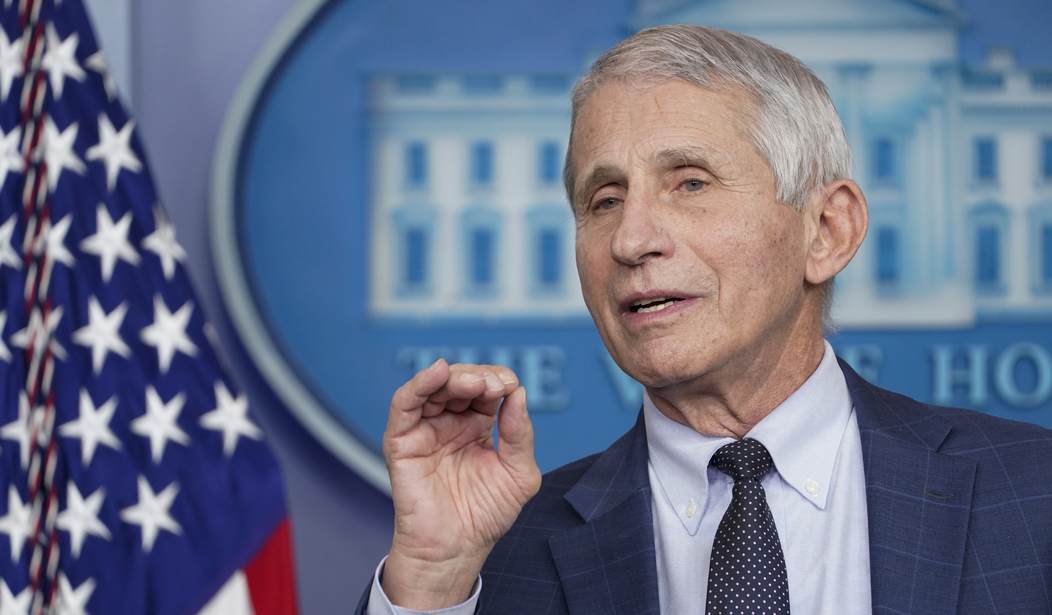Well, no wonder. His TV time is a fraction of what it was six months ago.
At least we finally have an answer to the question of how we’ll know officially when the pandemic is over, though. Answer: When there’s too much else going on in the news for CNN to devote a segment to interviewing Fauci.
Before you celebrate, note that he reiterates here that he won’t feel comfortable leaving until we’re through the “pandemic” phase of COVID. And he warned just yesterday that a new surge might be on the way.
If the pandemic never ends then he can never retire, right?
“From what I know about human nature, which I think is pretty much a lot, people are kind of done with COVID,” Fauci said…
And if the U.S. does continue to make its way back toward normal times, Fauci himself has a personal choice to consider. At 81 years old, the director of the National Institute of Allergy and Infectious Diseases is “certainly” thinking about retirement.
“I have said that I would stay in what I’m doing until we get out of the pandemic phase and I think we might be there already, if we can stay in this,” Fauci said, referring to the falling cases and hospitalizations in the U.S.
“I can’t stay at this job forever. Unless my staff is gonna find me slumped over my desk one day. I’d rather not do that,” he said, laughing.
I’m surprised to hear him say that he knows a lot about human nature because the thrust of this long WaPo profile of him from January was that he’s disoriented by the partisan polarization over COVID, describing himself at one point as having been “shaken” by it. “There is no truth,” he said of the public debate. “There is no fact.” He lamented “the almost incomprehensible culture of lies” around the virus and the vaccine before admitting, “There’s no diagnosis for this. I don’t know what is going on.”
It’s America 2022, buddy. We’ve had the Internet for 25 years. Only now are you clue-ing into the fact that, when information is ubiquitous, people will seek out information that affirms their priors?
Regardless, conservatives now have a strong incentive to take maximum precautions against the virus if and when we see a new mini-surge due to the BA.2 substrain of Omicron spreading. The fewer cases there are, the more convincing it’ll seem that the pandemic stage of the crisis really has passed, and the more incentive Fauci will have to pack it in. He’s not going to accept that gold watch until we’ve had a good long run at a low infection rate. Wear the mask. Retire Fauci.
David Leonhardt has some interesting data today about COVID and partisan polarization, although not the sort you’re used to. Typically analyses of the pandemic and partisanship compare risk-averse Democrats to risk-tolerant Republicans, with the former much more likely to get vaccinated and mask up than the latter. But the truth is more complicated, Leonhardt writes today. It’s true that Democrats are more risk-averse than Republicans — but certain Democrats are much more risk-averse than other members of the party:

Not much difference there between liberals and moderates. And, weirdly, the share of liberals and the very-conservatives who see great risk from COVID is almost identical. (Which I assume is a function of the “very conservative” group trending older, the danger zone for severe illness from COVID.) But gaze upon the very liberal group, of which more than 80 percent perceive “some” risk to their health from COVID even though there are bound to be many healthy young adults in that cohort.
The very-liberals are a smallish constituency overall. But they punch far above their weight in major cities, which is why we’re still seeing stories like this as we enter year three of the pandemic.
Leonhardt’s diagnosis of their overcaution is shrewd. The very-liberals tend to be white and highly educated, a group that’s known for caution in all things: Natural food only, extra safety measures for bike-riding and children’s sports, and so on. That “safety first” attitude has unsurprisingly spilled over into their approach to COVID. A group that’s highly educated will probably also be more likely to educate itself aggressively about a disruptive new threat like COVID, staying up to date on the latest studies and the most effective ways to hedge one’s risk of infection. The problem is that public health experts and American media skew towards doomsaying. The very-liberals, having absorbed that pessimism, therefore skew towards doomsaying too.
The result is that taking maximum precautions at all times seems like not just the prudent thing to do — even in situations, like classrooms, where maximum precautions aren’t justified by the data — but a way to signal to others how well educated you are about the virus. No wonder then that the very-liberals love Fauci so much: Irrespective of his personal politics, as a highly educated scientist and tireless proponent of erring on the side of caution, he’s the very model of a “very liberal” American himself.
Exit quotation via Rand Paul, describing Fauci: “We’ve learned a lot over the past two years, but one lesson in particular is that no one person should be deemed ‘dictator-in-chief.’ No one person should have unilateral authority to make decisions for millions of Americans.” When did Fauci gain “unilateral authority” to make health-care policy? I thought that was Biden, America’s governors, and various legislatures who do that. Fauci doesn’t even work for the FDA and CDC.








Join the conversation as a VIP Member